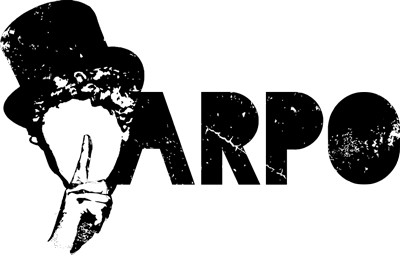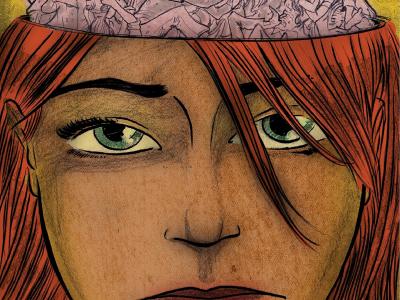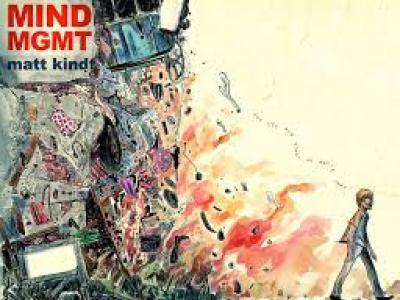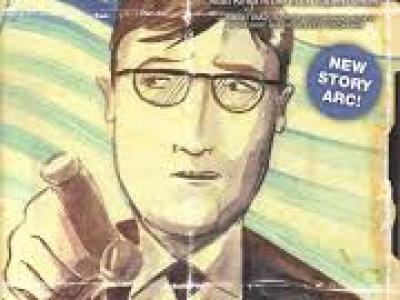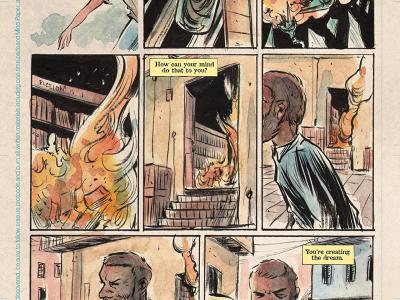Per un momento è sembrato Matt Kindt dovesse toccare il cielo con il suo segno.
Grazie al suo paranoico MIND MGMT, a Pistolwhip, Revolver, Superspy e 3 Piani - La storia segreta dell'uomo gigante e, soprattutto, al suo tratto idiosincratico, ha suscitato un grande interesse e accorpato l'interessamento di diverse case editrici. Forte di un approccio stakanovista alla produzione a fumetti, l'uomo è un autore a tutto tondo, esploso tra media diversi e approcci tanto sperimentali quanto complementari tra loro.
Seguirlo significa seguire la progressione logica di una mente che conosce se stessa mentre si mette al lavoro. Disegno dopo disegno.
MIND MGMT, che ha purtroppo smesso la pubblicazione in queste nostre amare italiche sponde, è il simbolo del suo stare al mondo.
Un fumetto da lui curato da cima a fondo, dalla copertina, all'inchiostro, passando per note, colori e architettura tanto visiva quanto contenutistica. Un universo di spionaggio, psicosi e poteri psichiche, memorie avariate, personalità disadattate e aberrazioni psichedeliche. La paranoia dickiana che ci meritiamo.
Ne ho parlato direttamente con l'autore. L'intervista che segue è in lingua originale.
I've been reading your Mind MGMT only for a few weeks, any advice for the trip?
Take your time with each issue. There’s a lot in each one, from the text on the side of the page to back covers and short stories in the back. I’m trying to make each 24 page chunk of story a unique experience by itself but also part of a larger tapestry that is this very large story that spans all of world history so it will take a while to tell the story. I find that a lot of mail that I get regarding Mind Management is positive but it makes some readers feel like they’re “not getting it.” That is the feeling I’m trying to convey so the reader will feel like Meru feels as she goes on her journey. But trust me, all the questions you have will eventually be answered and everything will be made clear – well, mostly!
In these first moments, the atmosphere of the events stands somewhere between The man who knew too much (1956's version), P. K. Dick and quite an huge amount of spy stories, conspiracies drama and an aptitude towards paranoia. Do you think that there's something there that fascinates you even unconsciously? And what about the abundance of conspiracies theories in everyday life (or, uhm, internet)?
I think since I was a kid – the first time I realized that the Zapruder film existed and there might be another explanation for the Kennedy assassination, I was a changed person. I was probably 10 or 11 years old when I started thinking about that kind of thing. After that, all through school and even after I graduated I was obsessed with conspiracies and the idea of “truth” and how unobtainable it is in regards to historic events. What has always been enticing to me is the idea that we will never know the truth regarding any circumstance. We can only guess and look at the shadows on the cave wall and guess at what’s really happening. My idea of heaven is that we’ll eventually know all the answers to all the questions we’ve had here on earth. Like a giant library that you can walk through and pick up a book and read the real story of what really happened at any point in history. That element shows up in Mind Management as a real library which is an idea I’ve always fantasized about. The ultimate truth library. I will say, as I get older I tend to give less credence to conspiracy theories and subscribe more to the idea that the simple answer is probably the correct one.
Do you think that modern day serialization is being someway changed by what's going on in tv serials?
Yes – it is really great to see TV going through the same sort of re-birth that the comic book industry has been going through in waves since 1986 when Alan Moore, Frank Miller, and others started changing our expectations of serialized narrative. The idea that you can now sit down and watch 12 hours of a TV show all in a row like you would sit down and read a novel has really changed how you can write television. I think that’s something that’s always been around in comics but has started to get lost as the graphic novel has become the standard format. In the US, serialized comics still exist but there is less and less reason for them – as creators end up writing with the intent to collect into a book anyway. What’s lost there is the beauty of a single issue of a comic book. The idea that 24 pages can be taken in once a month and change the reading experience. So I’m trying to make the montly comic not only relevant again, but to show how much can bed one in that format.
How do you fit between modern day “underground” niche and the structure of big companies?
The difference is large. With the big companies you are basically “renting” their character and taking it for a spin. Nothing can really change from beginning to end. The reader and the publisher have certain expectations that have to be met and a character that changes isn’t one of them. But that’s an interesting creative box to work within – to take a character like Martian Manhunter, who can’t change from page 1 to page 24. But the trick is to NOT change the character, but reveal something in that character that changes the way the reader thinks about the character between page 1 and 24. With independent and creator-owned work, that artificial limitation isn’t there. You can approach the work like you would a novel. The characters are who they are and the ending can be finite. Characters can evolve and change over time and become more real. I think that makes creator-owned work more immersive. You’re pulled into that world, rather than big-company characters in which the reader is painfully aware of all the history and the tropes that make those stories tick.
I'm strongly interested in the way you manage your time and working schedule. For example, an ongoing project like Mind MGMT how does it fit in your everyday life?
My average work day is 12 hours. And I probably work 6 days a week on average. I’m either writing, drawing, painting, or inking. And on some days I’m doing a little bit of all of those. It keeps it interesting for me – I never get burned out on one part of the process and it really keeps things fresh. I really love what I do. I enjoy reading and playing games and tennis but I prefer making comics to anything else. Having a fantastic wife and daughter to help balance that out makes all the difference as well. There’s no turmoil in my life other than the stuff I make up in the stories. It’s a very peaceful existence.
In the same sense, which are the practical tools you cannot work without?
I think every time I approach a new project – I try to think about a different way to work – or set artificial rules up for myself. When I wrote the book 2 Sisters, I set up a rule that I wouldn’t use any text captions and I wouldn’t abruptly change scenes – it would flow smoothly like one long shot in a movie. On MIND MGMT I am literally trying to make the most dense 24 page comic I can make every month. I’m layering text and experimenting with the design and covers and really just trying to fill every inch of the printed space with content that relates to and helps further the story and themes. As for material, I’ve adopted a pretty standard format – using water color paper, ink, brush, pens, and water color. With covers I tend to get a little more creative – for issue 29 of MIND MGMT I used eraser shavings to sculpt the cover image. To me, the content of the story dictates the material and the technique that I use. I think Dave McKean is a big influence in the world of comics – someone that’s able to use ink very well but isn’t afraid to use other mediums to create images. Outside of comics I think I’m really influence by performance art of all things – the idea that the concept comes first and dictates the form that the art will take.
How do you work on your color palette?
Again, the color palatte is really dictated by the story – so depending on what chapter of MIND MGMT I will vary the palette. In issue 10 of MIND MGMT for instance, I used Edward Hopper’s (the painter) color palette exclusively to convey the kind of emotion and feeling that his painting convey. I’m influenced by everything – from movies – Jean-Pierre Jeunet’s color palettes are always my favorites, to painting (Edward Hopper), to old movies – I actually love black and white as well. But always, the story comes first, and then I look at it and respond to that – and pull on whatever occurs to me as inspiration after it’s written.
In the wild ride for Mind MGMT had you ever the impulse of changing drastically your story, throwing all up or just put your own universe of ideas into it?
I have a detailed outline that I’m following that I wrote before I started – so I have basic sign-posts and goals that I have to get to from issue to issue and story arc to story arc. But I leave myself some room to bend things and add things when ideas come to me. So overall, the story is set, but a lot of the specific scenes are up in the air to keep me interested and engaged while I’m finishing it. It’s one reason I like drawing my own stories – I’m afraid I would drive another artist crazy with last minute ideas. But since I do everything myself, I have the ability to change it up until the last minute when inspiration strikes.
How do you perceive, now, the moment in which you realized you could live thanks to you work in comics and could leave your everyday-job?
I lost my last day-job back in 2003 and I’ve been doing comics full-time ever since. I would say it wasn’t until Super Spy and 3 Story came out that I was able to live more comfortably and not worry about money. MIND MGMT has really helped to solidify things and I now have a larger studio and can turn down writing jobs if they don’t inspire me. So that is a luxury I’ve only recently discovered over the last few years. There were some tough times. Even at the beginning of MIND MGMT – I knew what the order numbers needed to be for me to keep doing the book, and I remember distinctly sitting at my drafting table, staring at issue 3 that I’d just finished and questioning everything I’d done with my life to date. Issue 3 was going to be the first issue where I’d know if it was selling well enough to keep going or if it would have to end with issue 6. Luckily it outsold everyone’s expectations and now I don’t question my existence anymore!
How do you manage to balance between prose and art, writing and illustration?
The writing is the thing that interests me most – but it is really hard to divide the writing process and the art – they are so intertwined in comics – unlike any other medium. When I’m writing – I really just see the page in my head and describe it while typing. As far as graphic design concerns – I feel that the look and production of a book is often overlooked by the writer. The cover is really the first page of the story so it’s the most important aspect of the comic in a lot of ways. It needs to be considered while writing, not as an after thought once the insides are done. The experience a reader gets, from paper selection to ink, and design is all part of the story – and it’s a part many don’t take advantage of.
Would you be able to individuate in your career what you consider to be your biggest failure and your greatest achievement?
I don’t really look back and see any failures or great achievements. I see a learning process. Even my earliest books that I might not be as proud of because of art or lettering – even those I think of as an artifact of the time and place – where I was at that time. It isn’t necessarily a triumph or a failure – but just a statement of who I was, what I was doing, and what I was thinking of at that time in my life.
A contemporary work (in every field, technique, media, etc) that you find amazing and great and a huge source of stimuli, and why.
True Detective television show – is the most recent thing I’ve seen that is just a testament to how great characters and great writing are all you need – the pulp genre that it uses is just the window dressing for two great character studies which is very inspiring to me. I love the genre trappings but the idea that you can transcend those if very exciting to see.
©Daniele Ferriero
